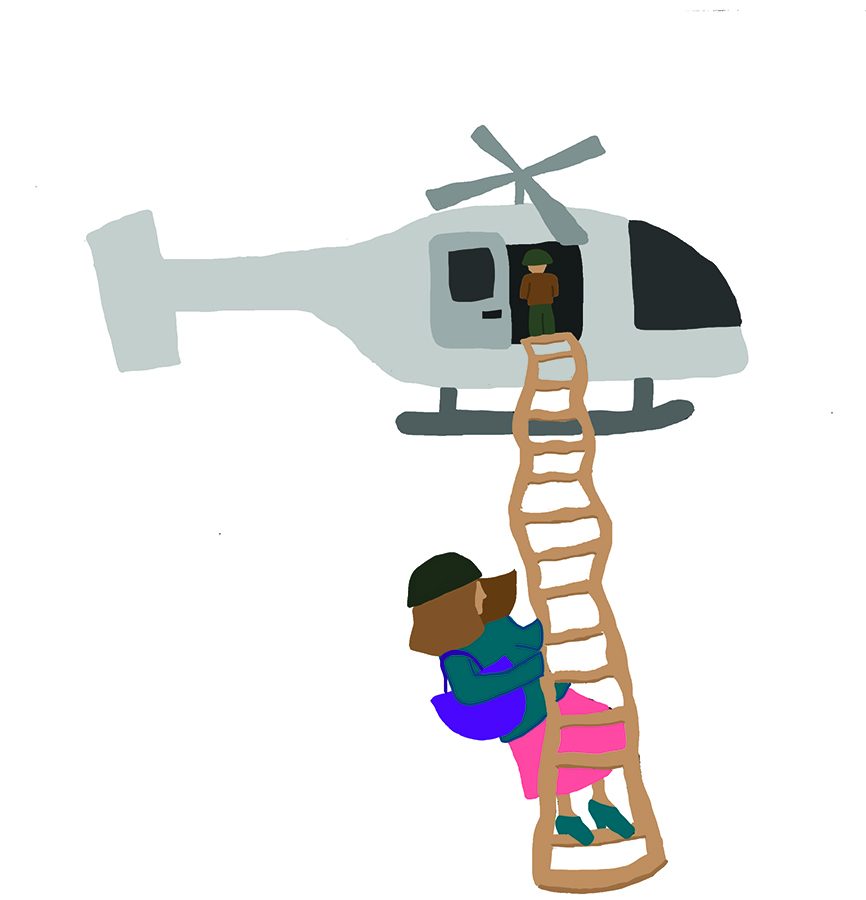Copter concerns
Imagine sitting at your desk, working through a fresh pile of new assignments. You look up and see your mom or dad hurrying over to you. They stop at your side, carefully peering at what you’ve accomplished so far. Then begins the series of typical questions. ‘How’s it going? Need help with anything? You sure? Why don’t I just take a look and double check?’ Your homework has now become their own. Parents like this have but one mission: to catapult their children to the peaks of academic greatness.
Helicopter parents, or parents who take an extreme interest in their children’s social and academic lives, have become more prominent over the last 20 years. It is normal for parents to want their children to succeed, but the issue is some parents are making all their children’s decisions for them. A 2013 study conducted by the Journal of Child and Family Studies concluded parents who regularly interfere in the choices of their son or daughter often leave them depressed and unsatisfied in their adult life.
“You definitely want to set the bar [high], you want the expectations to be there so that [the]
child challenges themselves, but not to the point where you’re risking the child coming out the other end with different sorts of problems as a result,” Cindy Coronado, gifted education teacher, said.
This sounds like advice any parent can and should be able to follow. Yet these über-involved parents are only becoming more frequent. In October, there will even be a seminar held by West County Psychological Associates meant for teachers and administrators in the St. Louis area who don’t know how to deal with these helicopter parents. According to Coronado, parents such as this might feel peer pressure if they see friends or coworkers with intelligent kids, or they could just be trying to rid their students of some anxiety.
But while making your kid’s flashcards might sound like a good idea right now, it will only teach them they don’t need to learn the material on their own. Even if the student does poorly on a test, they could still benefit from that experience. Failure teaches students perseverance, creativity and maturity, which are all skills essential to having a successful adult life.
Coronado also said parents who excessively insert themselves into their child’s life can lead them to assume their problems are more important than everyone else’s. Even worse, anxiety can also manifest itself in students who can’t cope with the lofty expectations of their parents.
Communication between students and parents can be very effective in trying to combat overprotective parents, according to Joshua Jaworowski, college and career counselor. If the student can be mature enough to have a conversation with their parents, they can end up solving
some of these problems.
So students, if your parent is pressuring you, don’t be afraid to tell them when they’ve gone too far. And parents, realize the effect your efforts could be having on your child, and take steps
to ensure you don’t leave them stepping out of school unsure how to proceed.
Any student who is genuinely confused about a class assignment or project should always have a supportive parent to turn to. However, parents need to remember their child is not only their child: they are an individual. It’s time to stop hovering over their heads. Find a place to land, take the keys out of the ignition, and hop off. And who knows, maybe you could even let your kid pilot themselves for a while.
Your donation will support the student journalists of Kirkwood High School. Your contribution will allow us to purchase equipment and cover our annual website hosting costs.

Interests: I try to write something new every day, and read a new book every week. Classical music is >>>>>> everything. I play piano,...

Interests: Cross country, art, playing with my dog, and watching Netflix
Favorite quote: “Sweet niblets!” -Hannah Montana
Favorite food: Chocolate...













